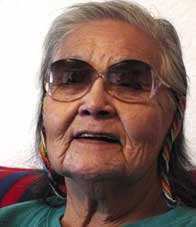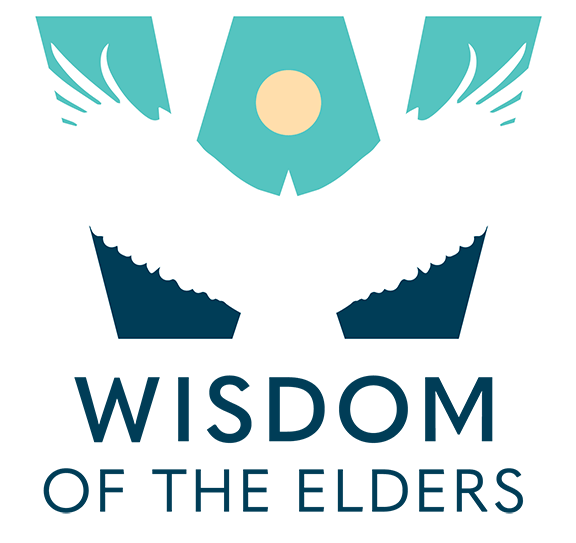Every Tree Has Its Own Name
 My name is Zona Loans Arrow now.
My name is Zona Loans Arrow now.
Everybody roamed this country. It was theirs. Tunkasina, Wakan Tanka created us and put us on this Turtle Island to take care of this Earth, so that it’ll replenish and we would benefit.
They were to follow the herds of buffalo, deer, antelope, whatever. They were meat-eating people and then herbs, too. They used the herbs as medicine.
We’d go off and hunt and in the fall about August, September, and October they go hunting. They bring all the meat they can. They use everything on the buffalo. They make the robes and leave the hair on one side. They scrape the fur off and they make tipis out of them for the winter. That’s what they go out hunting for. They use it for meat and they cook them because there’s always a famine in the wintertime.
And if you’re not a good worker as a woman your people are going to go hungry. You’ve got to learn to store. Dry it and store it. They dry the meat and they dry everything. Why? Because we are a people that travel. We don’t just stay in one place.
We had to learn to preserve our food and preserve the animal hides because that’s going to be your tent, your living quarters. Some of it’s going to be your clothing and your footwear, your moccasins, your gloves. Indians made gloves too. An Indian made parka hoods, and everything. They’re made out of buckskin. The skins of the hides of little creatures like beavers and muskrats and things. The mothers used to teach them and you had to learn these things to survive.
They were Isanti women. We’re taught to raise our children in a nice way; to learn all the things, how to sew, how to tan, how to cut things and make things for their family, and their clothing and their shoes. They taught them how to tan hides and how to make robes and tipis out of hides. They taught them how to pick the wood. Every tree has its own name. They taught them that. Sometimes you cut a tree down or you get some wood from that tree and it won’t burn right away. Some burn for a long time. They use that for the winter to keep it warm. They taught them how to make a tipi, how to warm it and keep the warmth inside of the tipi, how to stake them down and how to bank them.
The men knew how and when to go out and scout for animals like buffaloes, elk, moose, and different animals. They would bring it back to feed the people. It was always to feed the whole band not just you and your family, but the whole band. They would know how much in the tiospayes there are. How many people that they have to go hunting for.
On the sides for the wintertime, they put ground or earth around. Then the snow covers it up, and then it’s warm in there. There’s no air coming out.
Zona Loans Arrow
It is with sadness we report that Zona Loans Arrow passed away in July of 2007. She is greatly missed.
Zona Loans Arrow was Teton Sioux (Lakota), Santee Sioux (Dakotah), and Yanktonnai (Nakota). She was born in the Porcupine District on Standing Rock Indian Reservation in North Dakota, located in the northern part of the reservation near Cannonball, North Dakota. Zona served as President for the Board of Education for Standing Rock Indian Reservation and as Vice President on the Board of Trustees for Standing Rock Community College when it became Sitting Bull College in the 1990s. Zona is survived by eight children of her own and was Unci (Grandmother) to many adopted children. She was a very spiritual person and eloquently encouraged native youth to pursue their education to the highest degree possible and to be good examples to their families. Zona wanted her people to go back to their own ways of respect and honor, learn their language, and practice their arts and crafts. For that reason, she worked tirelessly to make sure that stories of her ancestors’ lives would be passed on, so they can serve as role models for younger generations.
She was a gifted storyteller and oral historian with a number of exemplary grandparents and great grandparents who taught her well of their 19th Century traditional ways and cultural arts, and who shared important oral histories and stories with her. She could remember some of these words for word. Her Great Grandfather was Chief Red Hail, an Uncle to Sitting Bull. Another Great Grandfather was Joseph No Two Horns, Yanktonnai medicine man, and artist. Two of Zona Loans Arrow’s stories have been on Wisdom of the Elders radio at www.wisdomoftheelders.org (Series One – Program Four – Elder Wisdom and Series Two – Program Three – Turtle Island Storytellers).
Unci Zona Loans Arrow shared oral history, storytelling, and cultural arts with all audiences. She shared the life story of Joseph No Two Horns for educational materials being published by the State Historical Society of North Dakota. She served as National Spokesperson for the launch of Series One Wisdom of the Elders Radio in April 2004 and made additional presentations to Indian education and rehabilitation, and religious organizations. She was happy to travel to share her stories and history.
